New Palestinian Envoy To Iran Meets Raisi, Slams Abraham Accords
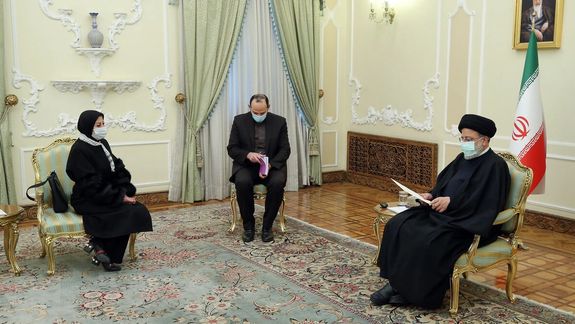
The new Palestinian envoy to Iran has met President Ebrahim Raisi and expressed concern over the growing relations between regional countries and Israel.

The new Palestinian envoy to Iran has met President Ebrahim Raisi and expressed concern over the growing relations between regional countries and Israel.
Salam Zawai presented her credentials to Raisi on Tuesday, replacing her father Salah Zawawi who was the Palestinian authority’s ambassador to Tehran for over 40 years.
Her appointment by President Mahmoud Abbas drew criticism and accusations of corruption and nepotism from some Palestinians. When Zawawi's father became ambassador, Yasser Arafat was the head of the Palestine Liberation Organization.
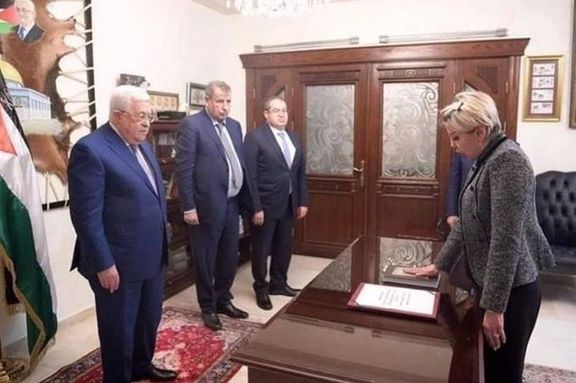
During the meeting, she congratulated the Iranian president on the anniversary of Iran’s revolution, describing it as a victory for the Arab and Muslim world, and slammed regional countries for their normalization of ties with Israel.
Iran, as Israel’s archenemy, has sharply criticized the United Arab Emirates and Bahrain for the US-brokered Abraham Accords normalizing relations with Israel in 2020. Common fear of Iran was a factor behind the move.
Zawawi expressed hope for the formation of an independent Palestinian state with Jerusalem as the capital, where she said Supreme Leader Ali Khamenei can lead prayers.
Last week, Israeli Defense Minister Benny Gantz paid a visit to Bahrain amid heightened tensions in the Persian Gulf after missile attacks on the United Arab Emirates by Yemen's Iran-backed Houthi movement.
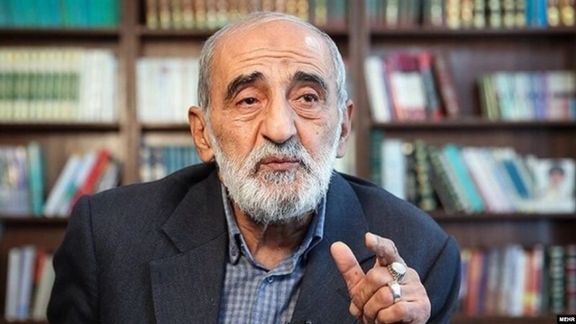
An editorial in Kayhan claimed views expressed by its hardliner editor Hossein Shariatmadari were shared by Supreme Leader Ali Khamenei and a unified ‘regime.’
Headlined "Let's Not Deceive Ourselves, Kayhan's Stance Is Leader's Stance," the missive on Tuesday responded to criticism from reformist journalist Ahmad Zeydabadi, who in a Telegram post Thursday wrote that Shariatmadari was behaving as if he is “top authority in the country” by lambasting reformist clerics who had issued a statement finding an “unmistakable crisis” in Iran.
The Kayhan editorial charged that if Zeydabadi were right, then “someone else should be appointed to take the helm of Kayhan… [as] stances put forth by the chief editor of Kayhan have nothing to do with the wish, will, and policies of the system.”
While veteran editor Shariatmadari is Khamenei’s representative at the newspaper, Khamenei has many times declined to follow Shariatmadari’s advice, including over backing talks with Europe two decades ago, with the Americans over Afghanistan and Iraq, and in Iran’s agreeing to limit the nuclear program in signing the 2015 JCPOA (Joint Comprehensive Plan of Action).
But Kayhan’s latest editorial asserted that as a "radical revolutionary," the paper’s chief editor was the first to announce stances the “regime” would subsequently adopt.
Kayhan argued that supporters of a nuclear deal claimed that Supreme Leader's support for the negotiation team led by former Foreign Minister Mohammad-Javad Zarif during the talks was proof of irrelevance of Shariatmadari's criticism, but Zarif's ill fate clearly showed that Shariatmadari's critical stance was the same as the Supreme Leader's stance.
"The one who fell to the ground in the confrontation between Kayhan and Zarif was Zarif, and the one who was honored was Hossein Shariatmadari," the editorial continued. It also reminded readers that Khamenei had last year described as a “big error” Zarif’s criticism of the role in foreign policy of Qasem Soleimani, the Iranian general and Quds Force commander killed by a US drone strike in Baghdad in 2020.
The newspaper was referring to Khamenei's harsh words against Zarif in May 2021 after a leaked audio recording of an interview with him made headlines. In the interview Zarif had strongly criticized the Revolutionary Guards (IRGC) and the former commander of its Qods force, Ghasem Soleimani for hijacking Iran's foreign policy. Without mentioning Zarif's name, Khamenei called the remarks "a big error," that was "regrettable and surprising."
"This was a big mistake that should not have been committed by an Islamic Republic official. The enemies are annoyed by the Qods Force's influence in the region," and one part of the political system should not undermine the other part, Khamenei said.
The editorial went on to suggest it had been Shariatmadari's criticism that had led recently to Ali Shamkhani, secretary of the Supreme National Security Council, retracting a suggestion of the possibility of direct bilateral talks with Washington over the nuclear issue.

Iran’s Supreme Leader Ali Khamenei has received his booster shot and urged people to do the same as the omicron variant of Covid-19 has gripped the country.
During a meeting with air force commanders on Tuesday, Khamenei said that he believes in and acts upon the recommendations of doctors and received his third dose of the vaccine a few months ago.
According to Alireza Marandi, Khamenei's personal physician, the supreme leader received the Iranian-manufactured Covid-19 vaccine called Cov-Iran Barakat, but some say political leaders have been inoculated by the AstraZeneca vaccine.
Khamenei had banned the purchase of US and British-made vaccines in January 2021, saying that "Importing vaccines made in the US or the UK is prohibited. They are completely untrustworthy. It is not unlikely that they would want to contaminate other nations… French vaccines are not trustworthy either”.
The number of daily Covid deaths is now over a hundred while daily cases are reported to be about 40,000.
Health authorities, who have said the country is in its sixth wave of the pandemic, warn the figures are expected to increase exponentially during the next two months, stressing that the new variant is also very difficult to detect.
Despite the highly contagious Covid-19 Omicron variant spreading fast across Iran, President Ebrahim Raisi has rejected proposals for a nationwide shutdown.
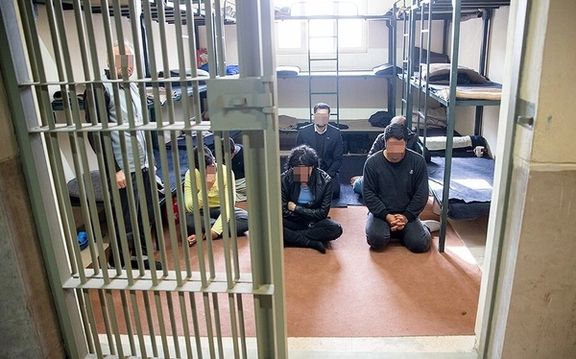
Hundreds of rights activists have asked five political prisoners held by the Islamic Republic to end their month-long hunger strike.
In a letter 650 activists said the hunger strike has raised awareness about the conditions of the Iranian prisoners of conscience and garnered support by many human rights organizations from inside and outside of Iran.
The letter urged the prisoners to end their strikes as reports indicate their health is deteriorating.
Shakila Monfared is being held in Qarchak Prison, also known as Rey Women Prison, while Hamid Haj-Jafar Kashani, Sina Beheshti, Mohammad Abolhasani, and Saeed Tamjidi are in Great Tehran Penitentiary, aka Fashafuyeh.
They started their hunger strike four weeks ago to protest neglect by prison authorities and the death of poet and political prisoner Baktash Abtin, who succumbed to Covid-19 complications after he was denied timely treatment by officials at Tehran’s notorious Evin prison.
Tamjidi, one of the prisoners who was arrested during the November 2019 nationwide protests, along with his fellow hunger-striking prisoners, was beaten by guards and medical staff when they were feeling sick and taken to the prison infirmary in late January.
Earlier in January, a young political prisoner, Adel Kianpour, who was on hunger strike to demand a fair trial died in detention without receiving any medical care in the Sheiban prison in the southwestern city of Ahvaz in Khuzestan province.

A hacktivist group has released footage from closed-circuit cameras in an Iranian prison to prove it hacked the security system of the detention center.
Hacktivist group Edalat-e Ali (Ali's Justice) sent the videos along with some files and classified prison documents to Iran International on Monday to prove they also hacked the computers of Ghezel Heassar prison located in the city of Karaj some 20 kilometers northwest of the capital Tehran.
The video shows security guards' reactions as their camera feeds were being cut off.
The documents received by Iran International include a list of hundreds of prisoners who were arrested during the November 2019 protests and their charges.
Many were sentenced to long term prison sentences and lashes on charges such as taking photos from the protests, parking their cars where the protests were held, having PDF version of forbidden books in their phones, or shouting slogans against the leaders of the Islamic Republic.
Another document, attributed to the judiciary and signed by Tehran’s deputy prosecutor Mir-Mostafa Seyyed-Ashrafi, was about proposed strategies to counter trials and tribunals about Iran’s human rights violations that were held in Europe, including the Netherlands, Sweden, and the UK.
The document contained details about the Stockholm trial of Hamid Nouri (Noury) as a judge and torturer in the 1988 wave of prison executions, and the Iran Tribunal about the mass executions of the 1980s in The Hague, as well as Iran Atrocities Tribunal that probes the 2019 protests that were the bloodiest in Iran’s history.
The document said although the verdicts of such trials are symbolic and non-binding but they can pave the ground for the arrest of Iranian officials abroad, adding that during the tribunals there were calls for President Ebrahim Raisi’s arrest for his role in the mass executions.
The document also mentioned the Albania-based opposition Mujahedin-e Khalq (MEK) and rights activist Masih Alinejad as evidence that the United States is also involved in these tribunals “behind the scenes.”
Last week, the group had also interrupted a website for the online streaming of Iran’s state television and broadcasted a video with a strong opposition message, calling on people to come out to protest.
Edalat-e Ali also released a “highly confidential" document on Twitter Wednesday, which was apparently the minutes from a November meeting of IRGC's ‘Livelihood-Based Security Crises Prevention Taskforce,’ saying the political situation in the country was dangerous.
The group had released a similar media package from security cameras of Evin Prison in August 2021 and claimed responsibility for hacking several Iranian government entities in the past three years.
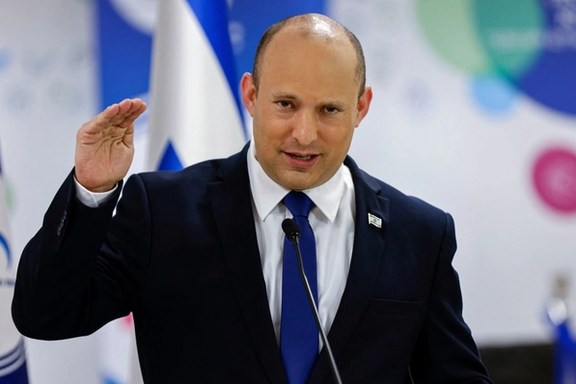
Prime Minister Naftali Bennett claimed Monday that United States President Joe Biden had accepted Israel’s “freedom to act” against Iran even in the event of a renewed nuclear agreement.
Bennett made the remarks a day after the two leaders spoke on the phone at length.“President Biden conveyed his unwavering support for Israel’s security and freedom of action, emphasizing his administration’s full support for replenishing Israel’s Iron Dome system,” said the White House readout of the call. Iron Dome is a surface-to-air defense against short-range missiles and shells.
Bennett portrayed US assurances as far wider. “I was happy that he (Biden) clarified explicitly that Israel will maintain its freedom to act in any situation, which is true, whether or not there is a deal... It’s important in relation to Iran.”
Israeli governments have opposed the 2015 nuclear agreement, the JCPOA, and have supported US ‘maximum pressure’ sanctions.
With Vienna talks due to restart this week, Israel's national security advisor Eyal Hulata said Monday the “danger in returning to the nuclear deal and losing the tools for the US to force a ‘longer and stronger’ agreement, as the Americans call it,” was “imminent.”
Hulata, a former head of external intelligence agency Mossad due in Washington Tuesday to meet US national security advisor Jake Sullivan, said Israel needed to “prepare for every scenario, whether there is a return to the [nuclear] agreement or not”.